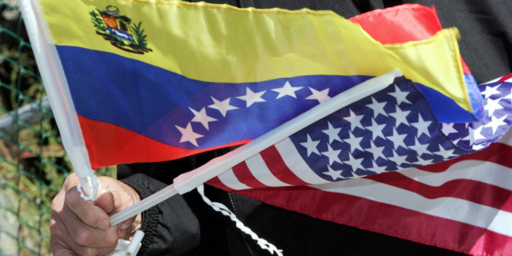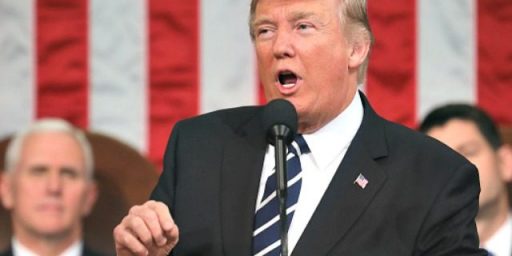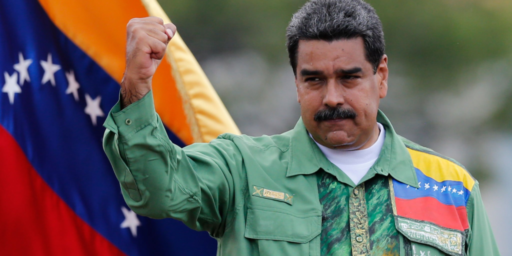The Continuing Turmoil in Venezuela
Cross-posted from PoliBlog:
WaPo has a piece on the political fallout from the move by Hugo Chávez to take broadcast rights away from RCTV: Protests in Venezuela Reinvigorate Opposition. The piece notes a number of groups and governments which have protested the move:
Spain’s Socialist government, in a joint declaration with the United States, called Friday for Chávez to renew RCTV’s license. The European Parliament voiced concern, and Brazil’s Senate passed a resolution calling on Chávez to reconsider, drawing a sharp rebuke from the Venezuelan leader.
“A head of state who doesn’t know how to live with democratic manifestation, such as that of the Brazilian Senate, is probably against democracy,” the president of that body, Renan Calheiros, said in response.
Reporters Without Borders, the New York-based Committee to Protect Journalists, the Chilean Senate and the Atlanta-based Carter Center have said freedom of expression could be in peril in Venezuela. “I think this weakens the Chávez government’s argument that it furthers free expression,” said Carlos Lauria, who has studied the case for the Committee to Protect Journalists. “It debilitates that argument.”
And along the lines of some behaviors that I noted earlier, here is a rather strained “argument” by a former Venezuelan Minister about the threat posed by RCTV:
In an interview with Colombia’s Caracol Radio on Thursday, Roy Chaderton, a former Venezuelan foreign minister who serves as a special envoy, argued that RCTV remained a danger to Chávez’s government.
Noting that the station recently aired “Feast of the Goat,” a film based on the novel by Mario Vargas Llosa about a tyrannical dictator and the uprising against him, Chaderton said the intention was to “cultivate” the idea of assassinating Chávez as a solution to Venezuela’s problems.
Well, there you have it. What democracy could survive if it allows such heinous propaganda to hit the TV screens of its citizens?
Indeed, there is a bit of paranoia emanating from Chávez in general:
Chávez, speaking Thursday, warned that “international rightist, extreme-rightist and fascist movements are attacking Venezuela from everywhere — from Europe, the United States, Brasilia.” That theme — that Chávez is in mortal danger — is constant in Venezuela, and political analysts say it is used to manipulate public opinion.
The danger of such talk from the President is that he will then try and use the need to protect himself, and by extension the nation, by further consolidating power and further curtailing free expression and independent political activity. You see, the opposition will force him to do so. He will have no choice. (Another example of paranoia and TV was noted here).
Hopefully this following evaluation is correct, but I have my doubts:
Michael Shifter, a senior analyst for the Inter-American Dialogue, a Washington policy group that closely follows Venezuela, said he didn’t think it would get much traction this time.
“All of his previous attacks were on the corrupt capitalists, but this goes way beyond that and it touches on Venezuela’s cultural identity,” Shifter said of Chávez. “It’s very hard for him to talk of the rancid oligarchy here. These are university students protesting, not part of the old order.”




